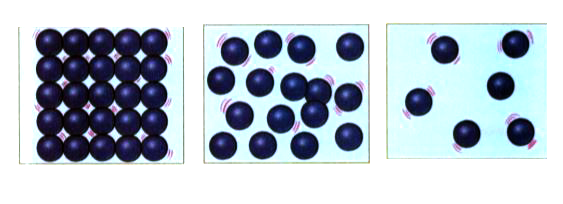Out of solids, liquids, and gases, which can be compressed the most?
To determine which state of matter—solids, liquids, or gases—can be compressed the most, we need to analyze the arrangement and behavior of particles in each state.
1. Understanding Compression:
- Compression refers to the reduction in volume of a substance. When we compress a substance, we are trying to bring its particles closer together.
2. Particle Arrangement in Solids:
- In solids, particles are tightly packed together in a fixed arrangement. The forces between the particles are strong, which means they cannot easily move closer together. Therefore, solids have a very low compressibility.
3. Particle Arrangement in Liquids:
- In liquids, particles are also close together, but they are not in a fixed position. They can move around each other, which allows for some degree of compression. However, the compressibility of liquids is still relatively low compared to gases.
4. Particle Arrangement in Gases:
- In gases, particles are much farther apart compared to solids and liquids. The forces between gas particles are weak, allowing them to move freely. This large distance between particles means that gases can be compressed significantly by applying pressure, as the particles can be pushed closer together.
5. Conclusion:
- Based on the arrangement and behavior of particles in solids, liquids, and gases, gases can be compressed the most. The large spaces between gas particles allow for a significant reduction in volume when pressure is applied.
Final Answer:
- Gases can be compressed the most out of solids, liquids, and gases.
- Compression refers to the reduction in volume of a substance. When we compress a substance, we are trying to bring its particles closer together.
- In solids, particles are tightly packed together in a fixed arrangement. The forces between the particles are strong, which means they cannot easily move closer together. Therefore, solids have a very low compressibility.
- In liquids, particles are also close together, but they are not in a fixed position. They can move around each other, which allows for some degree of compression. However, the compressibility of liquids is still relatively low compared to gases.
- In gases, particles are much farther apart compared to solids and liquids. The forces between gas particles are weak, allowing them to move freely. This large distance between particles means that gases can be compressed significantly by applying pressure, as the particles can be pushed closer together.
- Based on the arrangement and behavior of particles in solids, liquids, and gases, gases can be compressed the most. The large spaces between gas particles allow for a significant reduction in volume when pressure is applied.
- Gases can be compressed the most out of solids, liquids, and gases.
Topper's Solved these Questions
- MODEL TEST PAPERS Book:ICSEChapter:MODEL TEST PAPERS Exercise:Model Test Paper 1 (Section II)
Explore 32 Videos
- MODEL TEST PAPERS Book:ICSEChapter:MODEL TEST PAPERS Exercise:Model Test Paper 2 (Section I)
Explore 29 Videos
- MATTER Book:ICSEChapter:MATTER Exercise:THEME ASSIGNMENT
Explore 25 Videos
- PHYSICAL QUANTITIES AND MEASUREMENT Book:ICSEChapter:PHYSICAL QUANTITIES AND MEASUREMENT Exercise:Picture Study
Explore 3 Videos
Similar Questions
Knowledge Check
Out of solids , liquids and gases, which one has all the three types of modulus ofelasticity and why gases have only bulk modulus of elasticity.
ASolidsBLiquidsCGasesDBoth solids and liquids
(c) Under what conditions do solids, liquids and gases change their state ?
View SolutionThe gas which can be compressed most easily among the following is
View SolutionCompare densities of solids, liquids, and gases.
View Solution(b) Why do solids, liquids and gases differ in their physical state ?
View Solution
a.Identify which of the above pictures shows particle arrangement in solids, liquids and gases. Write in the space below each picture.
b. Which state of matter would you expect to show a fixed volume?
c. Why do you think gases can flow whereas solids cannot?
View SolutionOut of crystalline and amorphous solids, which can be cleaved easily ?
View SolutionCan sound pass through solids, liquids, and gases? Give reason.
View Solution